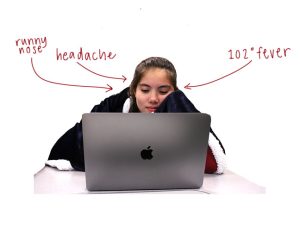Editorial: Communication clears confusion about absence policies
Communication between students and teachers is imperative to alleviate issues with absences and make up work.
January 29, 2020
Last issue, the Epic’s staff editorial introduced the issues of missing school when sick, tackling make-up work and the lack of student-teacher communication in these scenarios. An initial survey filled out by 126 students in December revealed a range of challenges faced by students, including fear of an overwhelming amount of make-up work and the possibility of missing important classwork. This issue, the Epic’s staff editorial will focus on attempting to unpack the complex sides involved with the difficulties students and teachers face regarding make-up work.
Sometimes, students hesitate to approach their teachers to discuss missed work because they fear that teachers will reject their request for an extension; however, the idea that communicating with teachers will be tense is often a misconception. In fact, in a survey of 437 students, 71.3 percent of students said that when they talk to teachers about absences and make-up work, the teachers seem understanding and helpful.
“I feel like teachers are more empathetic than you would expect, especially if you go to them, have a genuine conversation, and make an effort to explain your situation,” said junior Ria Chaudhary.
Proper communication between students and teachers is imperative when trying to mitigate issues regarding absences and making up work. Students need to ensure that they work with each of their teachers to set up new deadlines for make up work, either prior to their absence or on the day that they return. Without this communication, teachers face difficulties when grading assignments, organizing make up work and tests and planning future assignments for their classes. Additionally, if students fail to indicate the reason for their absence, teachers may feel compelled to assign a deadline without enough information about the student’s situation.
“I have found that taking the time to talk to each student when they return and figure out what is going on with them, as well as what is going on or expected in their other classes, helps me develop a realistic plan to get a kid back on track fairly quickly,” said teacher Ally Smith*.
Some teachers have implemented measures to promote proper communication with their students, such as providing templates for emails, enforcing deadlines for communication or inputting zeros in the gradebook until the missing assignments are completed. The guidance counselors have also introduced a guide to sophomores that aids them in planning make-up work after an absence. More similar and specific measures throughout the school, if made known to students, will help support better communication with teachers.
Although improved communication on the student’s part is necessary for make-up work and deadlines, teachers should also remain empathetic to the fact that students often have to contact five to seven teachers shortly after returning to school. This can be especially difficult since there are only two open tutorials per week. In order to support the process of communication, teachers should explicitly state whether they prefer to be contacted through email or in person and post their office hours in an accessible place, such as a website, School Loop portal or classroom door.
“I remember so many times I would go to a classroom during brunch or lunch and the teacher wasn’t there, they weren’t available,” Chaudhary said. “For most of the make-up work I got, I wasn’t actually able to get it from the teacher, I had to go to my friends in that class. It was stressful to figure out and complete all of my makeup work in addition to [managing] my normal coursework.”
By implementing specific measures to support communication, teachers can ensure effective discourse with their students. Nevertheless, students are responsible for facilitating that communication, as teachers often have more than 160 students to keep track of.
A school-wide absence policy is one suggested solution that could encompass these ideas to improve both student health and communication around campus. Students should not feel the need to sacrifice the quality of their work or face earning lower scores because they fall sick. Thus, the schoolwide policy should include specific instructions for different types of assignments in order to help students complete work effectively.
For general assignments, students should get at least the amount of days that they were absent to submit the assignment. Many teachers currently do not allow extensions for long-term projects; however, they should be considered based on the health of the student and the effort they have put into the project up until the time they fell sick. Students should not be required to make up a test the day they return from an absence, and all teachers should utilize the test make-up center when applicable, as the environment closely resembles a testing period in class. There are some concerns that students purposefully miss school to study for tests. Though this does happen, there are reasons students feel compelled to do so, including having an overwhelming workload.
“I think students should get the benefit of the doubt,” said senior Kavish Trivedi. “There are some exceptions, but the norm when students miss school is that they genuinely need a day off, whether it’s due to illness, or to get some work done.”
Addressing concerns about student absences and make-up work is imperative for creating a school environment that supports student wellbeing. In order to do so, students, teachers and administration should work together to create an improved culture of communication and flexibility.
“Getting sick is just [part of] life,” said government and economics teacher Jeffery Bale. “If you don’t have any degree of flexibility on that, and if you make students feel like it’s impossible to make things up, it’s going to put students in a situation where they’re going to come [to school sick] and parents will feel like they have to send their kids [to school].”
*Teacher name kept anonymous due to response on anonymous survey
**The Epic staff voted 37-0 in favor of this stance.
Read the previous editorial here: https://lhsepic.com/6786/opinion/editorial-reconsidering-absence-policies-to-accommodate-student-and-staff-needs/



































































